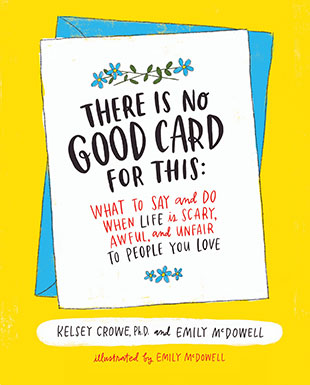Kelsey Crowe earned her doctorate in social welfare at the University of California, Berkeley, and teaches social work at California State University. Emily McDowell is a writer, illustrator, and CEO of a company that makes relationship-oriented greeting cards. She created the Empathy Cards for people experiencing tough times.
This book is a creatively designed resource for anyone trying to figure out how to best respond to and help a friend who is in crisis. The authors' goal is "to help you get a basic foundation in giving comfort, assess the difference between being supportive and being a buttinsky, and ultimately, to help you move past just thinking about a suffering person, to actually doing something (even a small thing) if the situation calls for it, and doing it with confidence instead of fear of what could go wrong."
We all have had a moment when we have been stopped in our tracks by learning of another's difficulty. The authors want us to trust ourselves, that we do care and can be of help. They explain three touchstones of showing up:
1) Your kindness is your credential.
2) Listening speaks volumes.
3) Small gestures make a big difference.
Using color to highlight their points and clever graphics to illustrate them, Crowe and McDowell invite us to approach this subject from many angles. In one box we find a map to "Life's Rough Neighborhoods" with areas for Grief, Mystery Diagnosis, and Illness. It warns: "Do not attempt navigation after dark or alone. Use extreme caution when Googling."
The authors chart some of the excuses people spew out when they do not feel compelled to offer help or do not know how. They acknowledge that people often make mistakes and disappoint each other. So when you are on the receiving end of another's help and presence, it's important to notice it and be grateful for it. "The more we can appreciate the small gifts that we receive, the more we can appreciate the small gifts that we offer."
In a very important section of the book, the authors present the primary losses a person may experience during grief: identity, companionship, community, and economic security. They note some of the feelings that muscle their way into our consciousness: hopelessness (it can seem like it will never end), fear, vulnerability, and a sense of being overwhelmed.
Other useful chapters include one with sample scripts of what to say and what not to say when hearing bad news. A chart lists "Unhelpful Statements" such as "Everything happens for a reason," "God doesn't give you more than you can handle," and "It could be worse."
There Is No Good Card for This contains a mix of workbook exercises, "Seeing It in Action" sample dialogs, and vivid illustrations. We were pleased with their explanations of the difference between compassion and empathy, knowing when to listen to those in dire straits, and the small gestures that can make a big difference.
We found the closing "Empathy Directory" with "Dos and Don'ts Cheat Sheets" to be a perfect supplement. They cover Illness/Chronic Health Problem, Divorce, Fertility Struggles and Miscarriage, Loss, and Unemployment.
